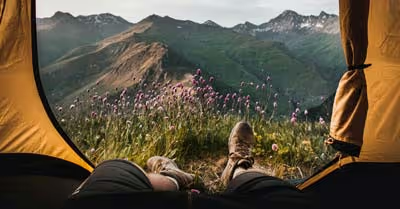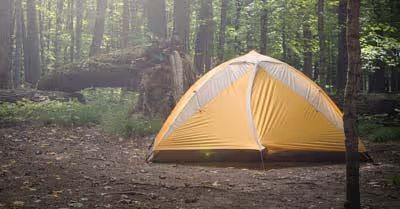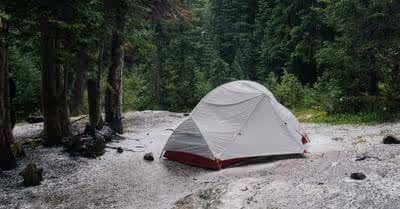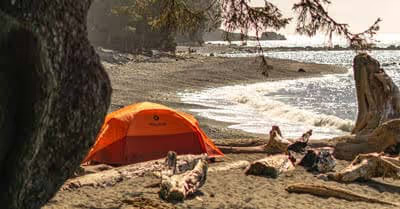Table of Contents
Do you need a tarp under a tent?
Sometimes, when people are trying to travel as light as possible, they wonder whether they need a tarp at all. A large tarp for a large tent can take up quite a bit of room, sometimes too much if you are trying to pack as little as possible. How much does a tarp under your tent even matter?
You cannot predict the weather, and your tent can get soaked if you do not put a tarp under it. For this reason, always bring a tarp with you - it is not something you can easily get away with forgetting. The bottom of your tent getting wet can ruin your whole trip.
Another reason why putting a tarp under your tent matters is that it can protect your tent from damage. If you don't bother with a tarp, rocks and bumps under your tent could damage the tent floor.
If you want your tent to last as long as possible, you have to take care of it, and always putting a tarp under it is part of this. Without a tarp, there is far too much wear and tear.
Selecting the right place to pitch your tent is important
Since there is no guarantee that a tarp will protect your tent from getting wet or from damage, you must select your site carefully. The ground should be flat, free of rocks, and free of roots. Anything that can make you or anyone with you uncomfortable while sleeping is no good.
Even if you have a tarp under your tent, you want to minimize the chance of damage. Go over the area and look for rocks or other objects that could be uncomfortable to sleep on or damage your tent. If there is a lot of wind, you might be able to use a natural object as a windbreak.
No matter how waterproof your tent is, you don't want to camp too close to a water source, as it might flood unexpectedly. A tarp under your tent obviously won't protect you from a flooded river either.
One of the most important things to remember is not to camp on low ground. Water flows downhill, and if you set up your tent on low ground, your tent might end up in the middle of a large puddle.
Even when backpacking, carry a tarp with you
If you are driving to your campsite, you can bring a lot of supplies, so bringing a tarp is easy. If you are backpacking, on the other hand, you have to minimize what you take with you. Bring a tarp that takes up little space instead of no tarp at all.
If you don't take a tarp with you, you might get away with it the first time, but sooner or later this will end in disaster. Heavy rain will come, and your tent will eventually get soaked.
Don't learn your lesson the hard way. Always take a tarp with you even if you are traveling to your campsite without a vehicle.
If your tent gets soaked, this can get all of your gear wet and might even make someone sick. Bring a very thin tarp that weighs next to nothing and takes up little space with you when traveling light.
Are tarps waterproof?
Most of them are only water-resistant. Tarps that are made of canvas are not entirely waterproof. If water is allowed to build up on top of a canvas tarp, it will eventually soak through it. Buy a tarp that is tough and waterproof - it is as important as the rest of your gear, so you should buy the best and not the cheapest tarp you can find.
What types of tarps are best for camping?
Tarps come in different shapes and sizes. Most of them are made out of either polyester (a higher-end material) or canvas. The polyester or canvas is coated in polyethylene or other materials such as vinyl. Some types of tarps are much better for protecting your tent than others.
How waterproof is the tarp?
Nothing is more important than how waterproof the tarp is. Some tarps are genuinely waterproof, others only water-resistant. Get a waterproof tarp that you can count on to keep the rain out.
Durability
Water-resistance isn't everything because a flimsy tarp is of no use even if it is waterproof. If you put a tarp over your tent, heavy wind can break it if it is not durable.
Wear and tear will ruin a weak tarp too quickly, even if you do not expose it to heavy wind. A good tarp should be fairly resistant to cutting and tearing. You don't want to pull a little too hard on a tarp and have it tear.
Resistance to the elements
It is best to buy a tarp that is resistant to mildew. Tarps are frequently wet, and mildew can make a tarp unusable. A good tarp might also be resistant to oil, grease, mold, and anything else that is corrosive.
Other considerations
Different tarps are coated in different materials. This not only makes some tarps more waterproof than others but more resistant to fire as well. Fire resistance is a great feature for a tarp to have.
Some of the ropes that tarps come with are better than others. The holes in tarps you use to tie them down are known as grommets. The grommets need to be as strong as possible.
Uses for tarps around your campsite
Tarps are not only for protecting your tent from rain. You should bring more than one of them because they have all sorts of uses in the outdoors.
A tarp can protect your campfire
When the rain is coming, an extra tarp can save your fire. You can quickly improvise a rain barrier before the rain starts falling heavily.
A tarp allows you to move stuff around and cook in the rain
You should never cook inside your tent, not even if it's raining. Cooking inside your tent will get your tent wet. Use a tarp to cover your kitchen and allow you to cook even if it is raining out.
A tarp can protect your tent from wind
Even if your tent is sturdy and set up properly, you do not want to allow heavy wind to blow against it. Use a sufficiently strong tarp to create a windbreak.
A tarp can provide shade
Some types of tarps can protect you from UV rays. While a fair bit of sun exposure is good for you and makes you feel good, you don't want to get burned. Use an extra tarp to set up a shady area for people to sit in.
A tarp can provide a place to sit
If the ground around you is wet, you can use an extra tarp as a dry place to sit. Bring more than one tarp with you, as you might have a use for a few of them at the same time.
What are the best materials for camping tarps?
Tarps are made out of many different materials, with each material having its advantages. Vinyl coated polyester tarps are one of the best options. Iron horse polyester is another good option.
Vinyl coated polyester tarps are waterproof and not merely water-resistant. They can keep the rain out whether you put them under your tent or over it. You can also use them to cover anything you have stored outside.
Vinyl coated polyester tarps are also durable and made to last for a long time. Since they resist water very well, they also resist mildew and other molds.
Another type of heavy-duty tarp that is worth considering is the iron horse polyester tarp. Ordinary cotton canvas tarps are not fully waterproof and not nearly as strong as iron horse polyester tarps. Another advantage of iron horse tarps is that they are breathable.
Poly tarps that are made out of polyethylene are of lower quality and have no real advantages over polyester or vinyl-coated polyester. Poly tarps are, however, much cheaper than polyester tarps. These cheap poly tarps are light-duty only as they are not very strong or waterproof.
Recent Articles
















